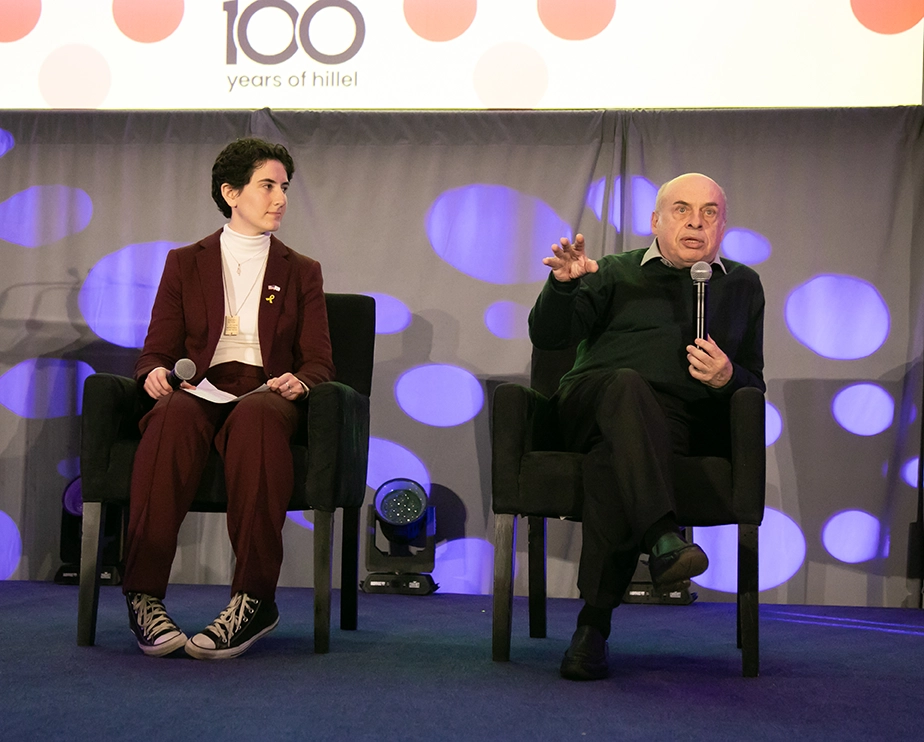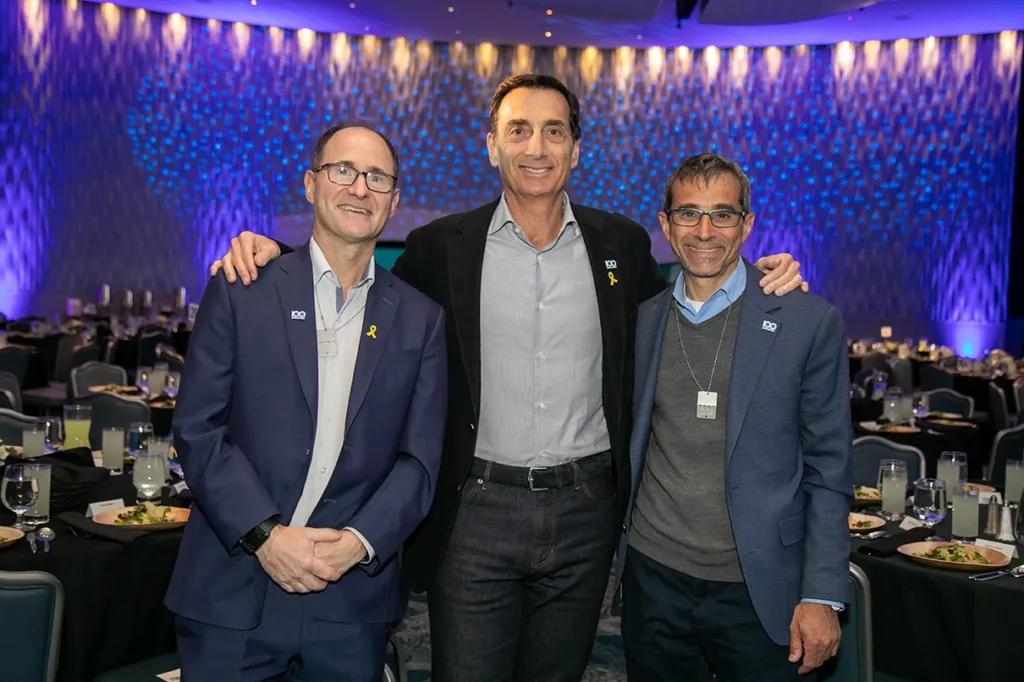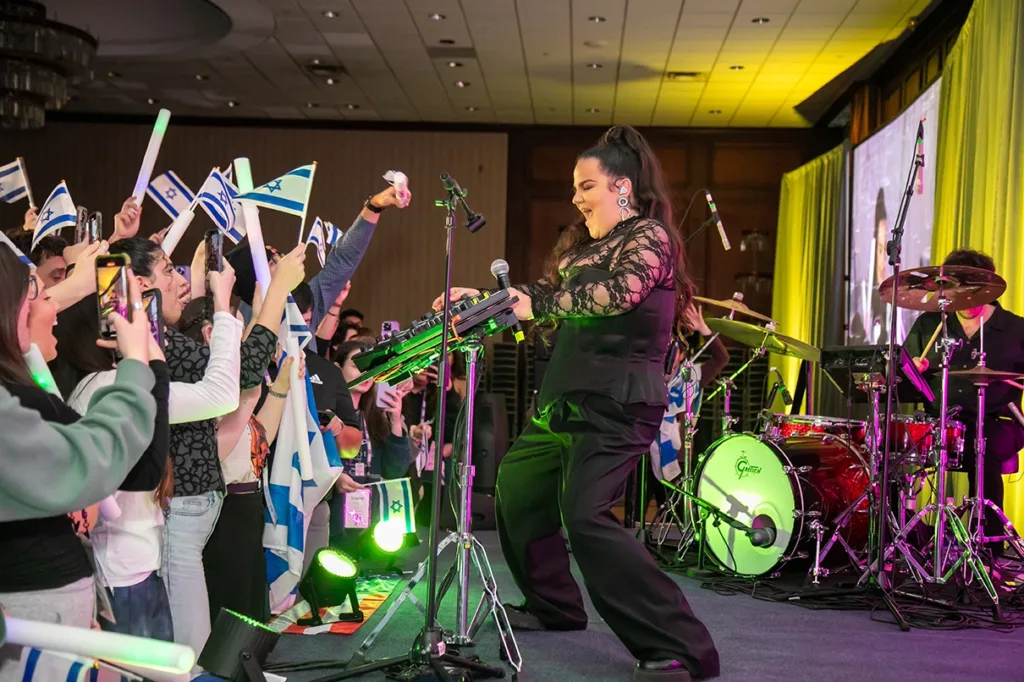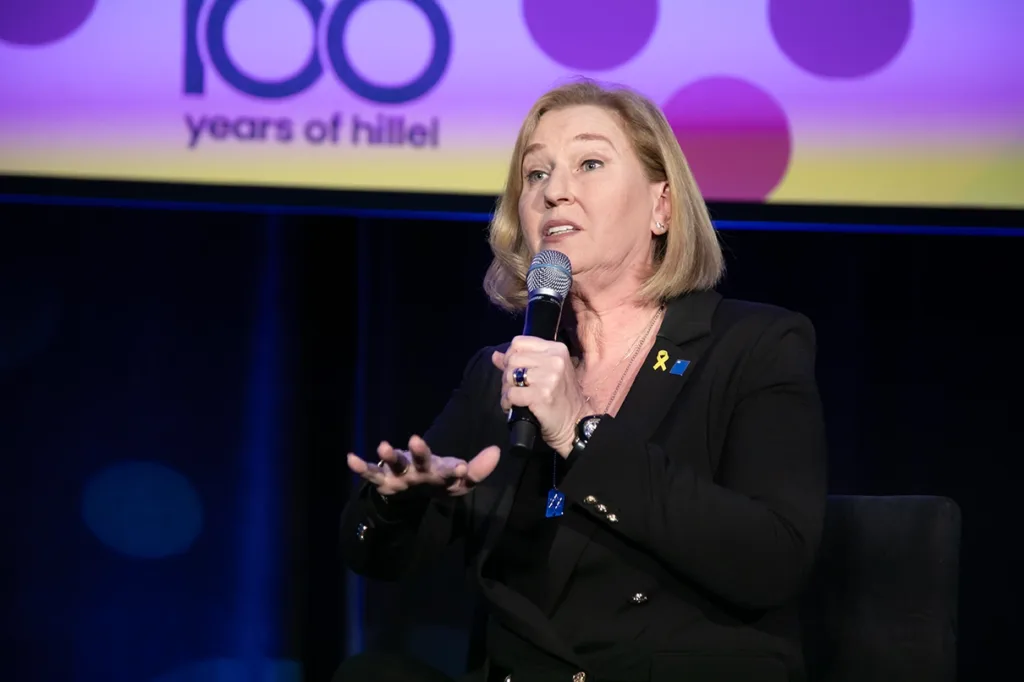Top Ten Moments from Hillel International’s 2024 Israel Summit

On February 25, Hillel International kicked off a two-day summit focused on Israel and countering antisemitism and efforts to delegitimize the state of Israel on college campuses. Atlanta played host to over 1,000 people — including more than 800 students! — at the 2024 Hillel International Israel Summit, the largest-ever gathering of Israel-focused student leaders within the Hillel movement. Students engaged in high-level workshops and heard from world-class speakers like Soviet dissident and human rights activist Natan Sharansky and Israeli government spokesperson and social media influencer Eylon Levy. They also attended master classes focused on Israel education and advocacy in this critical moment.
Here are the top ten highlights from this incredible weekend:
1. At the Gorgeous Georgia Aquarium, World-Class Speakers Took the Stage
Location, location, location! The incredible Georgia Aquarium in downtown Atlanta was a stunning setting for an evening of moving, empowering speakers.
Beginning with a video message from Israeli President Isaac Herzog, participants also heard from speakers including Adam Lehman, Hillel International’s president and CEO, and Renay Blumenthal, vice president of the Marcus Foundation, as well as student leaders like Jillian Lederman, a senior at Brown University and chair of Hillel’s Israel Leadership Network.
“Israel needs us now more than ever,” Lehman told students. “This moment calls for serious leadership. And that’s why your coming together for this Israel Summit is so important.”

Matthew Bronfman, chair of the Hillel Board of Governors, echoed the sentiment.
“You are leading your campuses to stand strong with Israel and stand up against hate,” he said. “You have the ability to make sense out of the chaos, and you provide each of us with what we as a community need the most right now — hope.”
Keynote speakers also included Hon. Tzipi Livni, Israel’s former Vice Prime Minister, Foreign Minister, and Justice Minister, and Israeli government spokesperson Eylon Levy.
“It can be scary to see so many people ganging up on the Jews, but … there has never been a time in history when the Jews have had so many friends and allies, friends who are scared to speak out and need you to give them courage,” Levy said.
The evening truly showed not just the power of the current movement for Israel advocacy, but also a glimpse at the future of Israel leadership — on campus, off campus, and beyond.
2. Netta Barzilai Brought Music to the Masses
In difficult times, turning to music is a longstanding Jewish tradition. Eurovision winner and Israeli songwriter and musician Netta Barzilai headlined a concert on the first evening of the summit, bringing the community together through music. When she took the stage, Barzilai did more than just lead everyone in song — she energized hundreds of Jewish students to raise their voices in solidarity, connection, and some much-needed joy.

3. Natan Sharansky Emphasized the Power of Endurance
One of the world’s most well-known political dissidents from the former Soviet Union, the Hon. Natan Sharansky has long been an advocate for human rights and democracy. He delivered powerful remarks that emphasized the power of endurance – and the value of the Jewish state, where he said he was finally able to express his opinions freely.
He also encouraged the audience to fight the virulent antisemitism and anti-Israel sentiment on college campuses today.
“When [protestors] deny the right of Israel to exist, when they demonstrate from the river to the sea … that’s pure antisemitism,” he said. “We should have no hesitation to fight it.”
4. Exclusive, Invite-Only Masterclasses Helped Students Increase Understanding — and Confidence.
At a time when being able to speak confidently about Israel is more important than ever, a select group of student leaders had the opportunity to attend exclusive master classes. The Honorable Tzipi Livni spoke about the realities of Israel on the front lines of the war in Gaza, while Eylon Levy conducted a session with students who shared the realities of antisemitism on campus.

5. Choose Your Own Adventure: A Record-Setting Fifty Breakout Sessions
With four main tracks to choose from — Community-Building, Empathy, Security and Pride, and Action — this year’s summit included fifty breakout sessions led by outstanding Israel educators in the Hillel movement and outside experts in fields like politics, advocacy, and the media. Session options included “Fostering Connection Between Israel and Diaspora,” “Using Torah as Insight During Times of War,” “Antisemitism Education for University Leaders,” and dozens more.
6. Hello from the Entire Israel Fellow Delegation!
This year’s speakers and workshop leaders included the full delegation of Jewish Agency for Israel Fellows — Israeli young adults who support Hillel students as they develop personal relationships with Israel and promote Israel advocacy on campus and beyond. Delegates spoke on panels, led breakout sessions, and shared their authentic, honest perspectives throughout the conference, leading to powerful moments of connection.
7. Black and Jewish Communities Came Together to Talk Solidarity
The complex but powerful relationship between Black and Jewish activism goes back generations, and solidarity between us has never been more important — or complicated. In a panel moderated by Winton Steward, Google’s head of public policy and government affairs for the Midwest, Black and Jewish voices came together to talk about intersecting identities, complex community dynamics, and the need for compassionate listening, advocacy, and shared goals and actions.
8. Experts Talked Geopolitics in the Middle East
“It’s complicated” is the go-to explanation for so many people about why they don’t feel comfortable enough to speak about the history and politics of Israel. In a one-of-a-kind master class, Ambassador Dennis Ross, the William Davidson distinguished fellow for the Washington Institute for Near East Policy, and Ghaith al-Omari, the institute’s Rosalinde and Arthur Gilbert Foundation senior fellow broke down the basics of international relations, busted some myths, and gave participants a clearer understanding of the key information they need to talk about Israel with confidence.
9. Women’s Voices Took Center Stage
Since October 7, women around the world have taken unparalleled leadership roles in demanding the return of the hostages, calling for recognition of the crimes against Israeli women and girls, and acting to ensure women’s voices are centered in conversations about the war. In a powerful and emotional panel, female leaders from across the political, education, and advocacy fields spoke about the role of women in this critical moment of Israel’s history, as well as the need for American-Israeli solidarity on this issue.
10. BRING THEM HOME: Moments of Powerful Solidarity with Hostage Families
This year, the awareness of the ongoing plight of the 132 hostages remaining in Gaza was a major theme of the summit. Speaking with heavy hearts but tireless determination, Moshe Lavi, whose brother-in-law Omri Miran is being held in captivity, and Leat Unger, cousin of hostage Omer Shem Tov, led a masterclass in advocacy and solidarity, empowering students to become voices for the hostages and underscoring the mounting need for decisive action to bring them home. Levi and Unger also spoke at the closing plenary session, urging students to “be there” for hostage families.
“These are human beings who were taken from their families, from their homes, from the fields, from a party,” Lavi said. “[They are] human beings who have family and friends, loved ones who are praying and acting 24/7.”
Photos by Dani Weiss Photography